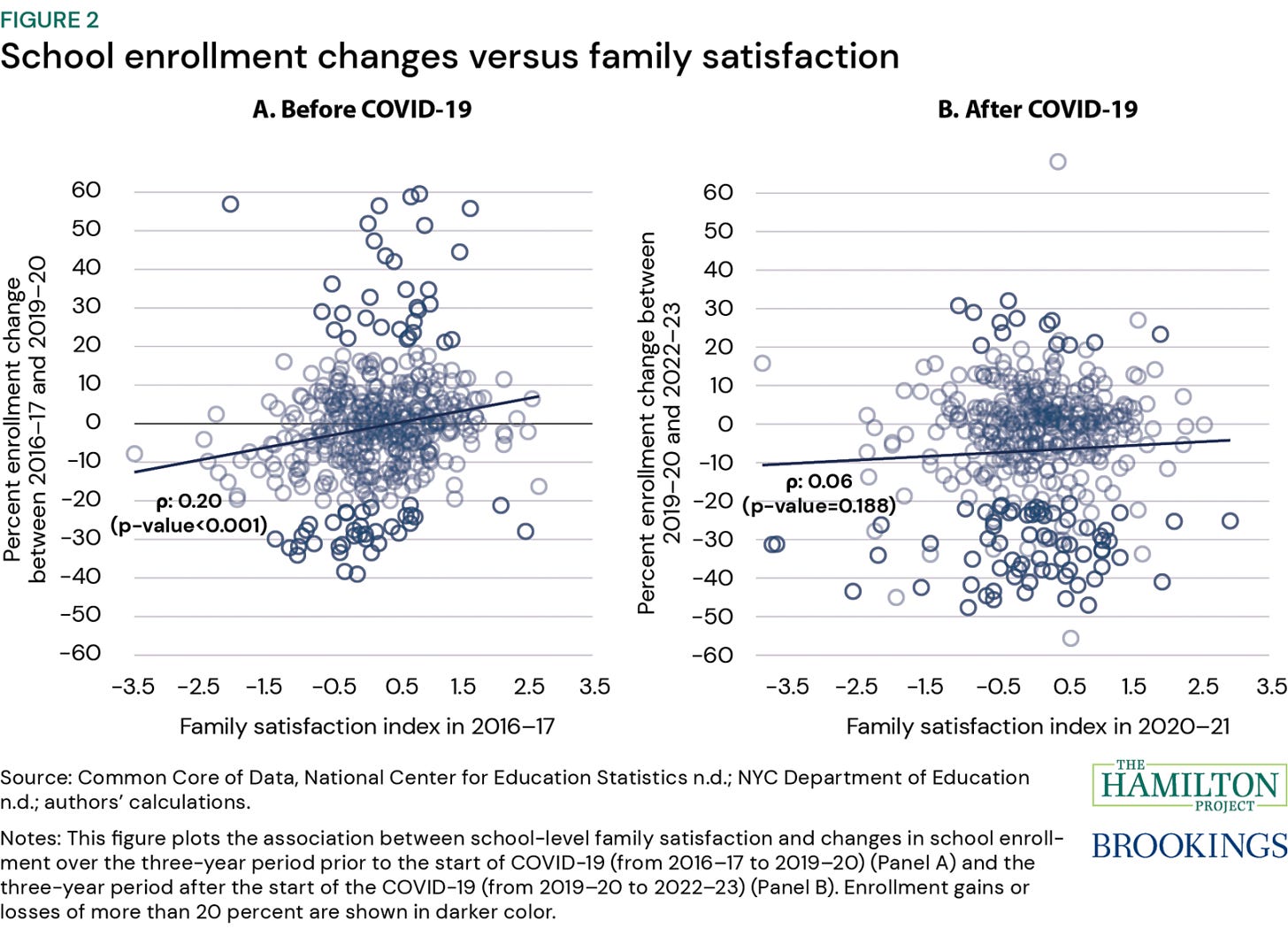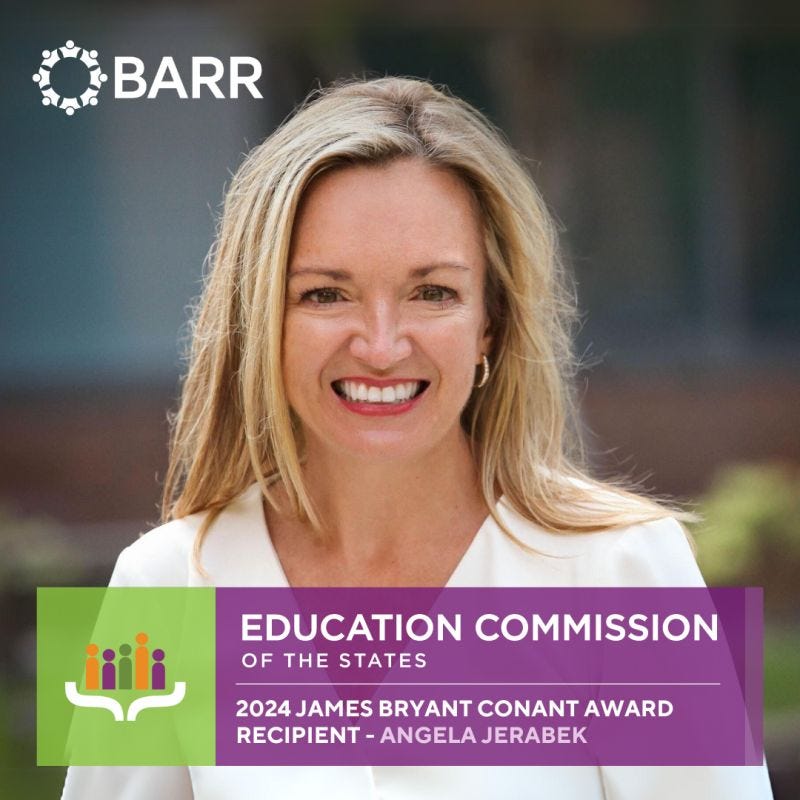Welcome back to the Education Policy Hotlist!
June brings a time of celebration for families, students, and communities as they mark significant achievements and milestones. I’m excited to experience my first graduation ceremony at Open School this Friday.
Nearly a decade ago, as a graduate student, I discovered Open School while leading data and wraparound service discussions. At that time, Andrew Mason, the then-executive director, was pioneering predictive modeling techniques to identify and assist students in need throughout Portland’s high schools. As board president, I see Open School’s ongoing evolution in addressing our students’ and families’ needs in the post-pandemic era.
Interested in discovering more about Open School and our initiatives? We invite you to a summer happy hour and trivia night. Join me and the Open School community on June 20th at Tear Drop Lounge in Portland, starting at 5:30 PM!
Follow the Hotlist 🔥
The reach, interest, and passion of the #EdPolicyHotlist community continually humbles me. In 2024, our growth has been remarkable, with leaders from 48 US states and 48 countries now among our readers.
For weekly updates, follow the Hotlist on Instagram, Facebook, LinkedIn, and Twitter 💖🔥!
Mark Your Calendar
June 13th at 9:00 am (EST), the Alliance for Learning Innovation is hosting a congressional briefing at the Dirksen Senate Office Building titled “Education R&D: Innovating Solutions for Today's Challenges and Tomorrow's Opportunities” to highlight the significant social, economic, and competitive benefits of sustained federal funding in education research and development (R&D). RSVP here.
Education Finance
Navigating school closures amidst budget and enrollment challenges
A new article discusses the complex decisions district leaders face regarding school closures due to budget shortfalls and declining student enrollment. It emphasizes the importance of being good stewards of public funds and ensuring all students are served well, a more pressing responsibility as federal pandemic dollars dry up. This analysis is crucial for the general public to understand the financial realities and strategic decisions impacting their local schools.
An analysis of K-12 funding inequities within metro areas
The report “Leveling the Landscape” examines the disparities in K-12 funding across different districts within large metro areas. It highlights that most public school students live in fragmented metro areas, leading to significant funding gaps between wealthy and less affluent districts. The study suggests that closing these gaps would require an additional $26 billion in state funding per year, which could help achieve more equitable funding per student.
School district financial woes 💰
San Francisco Unified School District faces a budget crisis, spending $1.3 billion against revenues of $1.1 billion, leading to state oversight of its budget decisions. This situation highlights the importance of fiscal responsibility and the potential consequences of mismanagement, which can result in state intervention and loss of local control. Check out the article for examples of what authorities might deem fiscal mismanagement.
Staffing versus enrollment trends
Edunomics Lab provides a tool for analyzing staffing and enrollment trends in education, revealing mismatches such as increased staffing despite declining student numbers. Understanding these trends is vital for districts to align resources with student needs and ensure financial sustainability in changing demographics. For my Oregon people, check out our state trends, which are critical to understanding during a season of budgeting complications and staff reductions ⬇️
Supporting Students Through Ambiguity
Understanding young adulthood in America
Bellwether Education Partners’ publication, “The Edge of Seventeen,” explores the varying age restrictions across states on various issues affecting young adults. This report provides valuable insights into the inconsistencies of policies that shape the transition from adolescence to adulthood, highlighting the need for a coherent approach to policymaking that considers the broader implications for young people and educational institutions.
Strengthening school connectedness to increase student success
This research brief discusses the importance of school connectedness for student success. It emphasizes that students who feel more connected to their school have higher attendance rates, academic outcomes, and graduation rates. The brief recommends strategies such as assessment, supportive adult relationships, and inclusive curricula to build a sense of connectedness among students.
Expanding post-high school opportunities
The American Academy of Arts and Sciences has launched a commission to ensure all students, particularly those underserved, have access to diverse post-high school opportunities. This initiative is essential for equipping students with the skills needed for a dynamic global economy and active societal engagement.
School district segregation
New America’s report on segregation between school districts in the 21st century highlights deep racial and economic divides affecting educational equity. The report is crucial for understanding how historic and systemic segregation impacts resource allocation and student outcomes, making it a vital issue for public awareness, policy, and financial intervention.
Assessment and Data
Civil rights standards for Indigenous Americans
An opinion piece in The Hill discusses the shortcomings of revised race standards in accurately representing Indigenous Americans. The article highlights that the new standards fail to address the unique political identity of American Indians and Alaska Natives, leading to misclassification and underrepresentation in data collection. This issue affects the quality of data and the allocation of federal programs meant to support Indigenous communities.
Grade inflation and education test scores
The Wall Street Journal reports a concerning trend of grade inflation in education, where students’ grades are rising despite declining test scores. This phenomenon has been observed since the pandemic began, with schools adopting more lenient grading policies. The piece suggests that while high school grades have increased, ACT scores have dropped, indicating a potential disconnect between perceived academic performance and actual knowledge.
Rethinking standardized testing 📈
The report “None of the Above: A New Vision for State Standardized Testing” by FutureEd proposes a new role for state tests to resolve the stalemate between accountability and instructional improvement. The authors suggest decoupling state testing from federal accountability systems, allowing for a focus on high standards and teaching effectiveness. This shift is crucial for policymakers and educators as it aims to enhance school performance insights and individual student progress tracking.
Academic Achievement
Boosting student success with high-impact tutoring
Collaborating with the National Student Support Accelerator, Results for America offers a virtual learning opportunity to help local education agencies design and implement high-impact tutoring programs. This initiative is significant as it aims to advance student achievement through evidence-based tutoring supported by expert guidance and funding strategies.
Summer learning participation
A RAND Corporation report reveals that while 81% of districts offered summer programs in 2023, less than half of eligible students enrolled. This finding is significant as summer programs are a vital strategy for academic recovery post-pandemic (if they focus on high-dosage tutoring and quality academic instruction), and the report underscores the need for policies that encourage greater participation to mitigate learning loss. Ultimately, this all comes back to relationships and school culture — school leaders and teachers have the responsibility of building a strong community and culture that leads to higher uptake of these out-of-school-time programs 😎
Innovative Learning Models
Why did schools lose students after Covid-19?
This article explores the decline in public school enrollment post-Covid-19 and suggests that many families have chosen to homeschool. It indicates that dissatisfaction with public schools after the pandemic may have prompted families to consider alternatives such as homeschooling. The analysis uses family satisfaction data and interviews with home educators to understand the factors behind this trend. Figure 2 illustrates that as family satisfaction becomes more complicated after the pandemic, other factors may contribute to unenrollment, like new interests and the need for learning flexibility.
Supporting innovative learning models
New Classrooms supports the Developing and Advancing Innovative Learning Models Act, which seeks federal investment to promote personalized education approaches. This legislation is pivotal for education reform, emphasizing the need for modernized learning models that cater to individual student needs and strengths.
Early Childhood Education
Universal pre-K success in Tulsa
NASBE’s report on Tulsa’s universal pre-K program shows long-term positive outcomes, including a significant boost in college enrollment. The success of Tulsa’s program, which has been linked to substantial academic gains, illustrates the potential impact of early childhood education on long-term educational and economic success. Specifically, students who attended universal pre-K were more likely to enroll in college than nonalumni.
The importance of play in learning
Brookings Institution emphasizes play's significance for children and adults, stating that it is not just a leisure activity but a serious form of learning. The article supports the UN’s declaration of an International Day of Play, advocating for play to develop essential skills and alleviate mental health issues post-COVID-19. It challenges the notion that play is frivolous, arguing that it is fundamental to 21st-century skills like problem-solving and creativity.
Curriculum Adoption
Curriculum adaptation and reading science
The 74 reports on criticism of EdReports for being slow to adapt its curriculum reviews to the science of reading. This critique is crucial as it affects the materials used to teach reading across schools, with implications for literacy rates and educational quality. As of this spring, all 50 states and U.S. territories have passed some form of statewide law or program to implement early literacy reform. If an organization like EdReports has outsized power in the curriculum conversation, state leaders must understand how to have a measured approach to these decisions.
Taking curriculum implementation seriously
The op-ed of AEI argues for the importance of curriculum implementation in education reform. It suggests that more than adopting high-quality instructional materials is required; there must be a sustained effort to implement the curriculum rigorously and with fidelity. The piece advocates for a multi-year journey to fully adopt a new math curriculum, highlighting the need for consistent implementation and innovation.
ICYMI
This summer, the Education Commission of the States will honor Angela Jerabek, Founder & Executive Director of the BARR Center, with the prestigious 2024 James Bryant Conant Award. Angie’s unwavering dedication to student success through evidence-based approaches has earned her this recognition. In these times, our children need leaders willing to invest in innovative ideas. Angie’s resilience, steadfastness, and insightful emphasis on relationships and data have significantly increased the number of children who thrive in U.S. schools.
Let’s congratulate Angela Jerabek on this remarkable achievement!












